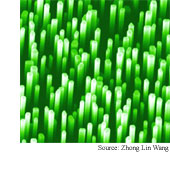|
NEWS
|
Nano electricity
 A
nanoscale forest
of zinc oxide nanowires converts motion and vibration
to electricity. The device could be used to power microscopic
devices, including sensors implanted in the body. (Piezoelectric
Nanogenerators Based on Zinc Oxide Nanowire Arrays, Science,
April 14, 2006) A
nanoscale forest
of zinc oxide nanowires converts motion and vibration
to electricity. The device could be used to power microscopic
devices, including sensors implanted in the body. (Piezoelectric
Nanogenerators Based on Zinc Oxide Nanowire Arrays, Science,
April 14, 2006)
A why interface
A software
framework allows programmers to build interaction
techniques that let users ask why and why not questions
about features of programs or actions that programs perform.
The interactions could make it easier for people to learn
to use programs and to understand programs' automatic
features. (Answering Why and Why Not Questions in User
Interfaces, Computer-Human Interaction (CHI) 2006, April
22-28, Montréal, Canada)
DNA copier flags toxins
A highly sensitive method of detecting
biotoxins makes use of tiny, cell-like sacs that each
contain 60-odd DNA strands. When a sac encounters a biotoxin
it breaks open to release the DNA strands; once released
the DNA replicates many times and so can easily be detected
to indicate the biotoxin. (A Liposome-PCR Assay for the
Ultrasensitive Detection of Biological Toxins, Nature
Biotechnology, published online April 16, 2006)
Camera phone mouse
An interface
for large displays lets people control the cursor
using only a camera-equipped cellphone that communicates
with the computer controlling the display. Previous large-display
control techniques use one or more additional cameras
or special markers in the display image. (Direct Pointer:
Direct Manipulation for Large-Display Interaction Using
Handheld Cameras, Computer-Human Interaction (CHI) 2006,
April 22-28, Montréal, Canada)
Blue betters white LEDs
The addition of blue
fluorescent molecules boosts white organic light-emitting
diode performance by 20 percent, moving cheap, energy-efficient
solid-state lighting a step closer to reality. (Management
of Singlet and Triplet Excitons for Efficient White Organic
Light-Emitting Devices, Nature, April 13, 2006)
Nanowire photon detector
Diodes made of crossed
silicon-cadmium sulfide nanowires amplify the electrical
current generated when light hits the devices. Closely
spaced arrays of the sensitive photon detectors could
be used as sensors and scientific imaging systems. (Nanoscale
Avalanche Photodiodes for Highly Sensitive and Spatially
Resolved Photon Detection, Nature Materials, published
online April 16, 2006) |
FEATURES
|
View
from the High Ground: Cornell's Jon Kleinberg
Six degrees of separation, buying gasoline
by the molecule, the science of popularity, all just getting
along online, intellectual prosthetics, Big Science, making
up questions, and telling stories.
|
How
It Works: Quantum computing: qubits
Photons, electrons and atoms, oh my! These particles are
the raw materials for qubits, the basic building blocks
of quantum computers. |
|
 |
News RSS feed 
Blog RSS feed 
Bookshelf RSS feed

New: TRN's
Internet Services
TRN's Jobs Center
|
| |
| RESEARCH
WATCH |
| April
12, 2006 |
Toward
implantable sensors
Highlights from the Body Sensor Networks 2006
workshop at MIT last week:
A
computer vision system from the MIT Media
Lab uses tiny wearable cameras to read facial
expressions in order to determine if someone
is paying attention, bored, confused, in disagreement,
or concentrating. The researchers are working
with an autism center to use the system as
a "social-emotional prosthetic"
to help people with autism communicate...
April 5, 2006
Kurzweil
keynote
March
16, 2006
DNA
nanotech made easy
March
12, 2006
Loneliness
trumps exercise |
|
|
| |
|
| |
"In
most areas of science and technology, the origins
of new breakthroughs can still be found in the work
of a small number of people -- or even a single
person -- working at their own pace on their own
questions, pursuing things that interest them. "
- Jon Kleinberg, Cornell University |
|
| |
|
| |
Thanks
to Kevin from
GoldBamboo.com
for technical support |
|

